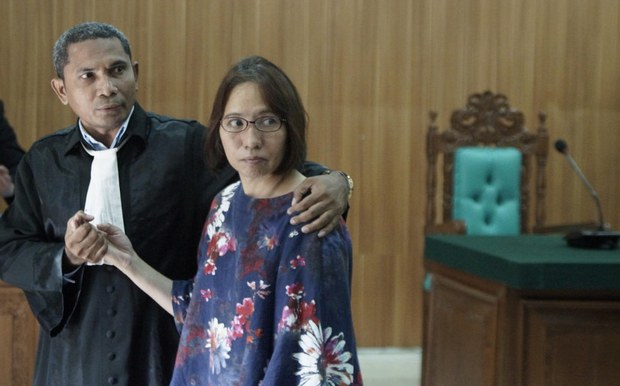© Image courtesy of Arie Firdaus/BenarNews
A TrialWatch Fairness Report released today finds that Indonesia’s prosecution of Suzethe Margaret for blasphemy violated the Convention on the Rights of Persons with Disabilities.
The report also concludes that Indonesia’s blasphemy law permits convictions “on the basis of ‘subjective feelings of offensiveness’” and is inconsistent with the rights to freedom of expression and religion, as well as with non-discrimination norms.
Dr. Charles O’Mahony, Head of the School of Law at the National University of Ireland, Galway and an expert on the rights of persons with disabilities, authored the report and gave the proceedings a grade of “C.”
This trial took place against the backdrop of efforts to expand Indonesia’s blasphemy law. Further, this is not the only time the law has been used against those experiencing mental health issues. For instance, a woman who believed she was a mythological figure was recently charged with blasphemy for a social media post.
In the immediate case, Margaret, a Catholic woman previously diagnosed with schizophrenia, ‘heard voices’ telling her that her husband was getting married at a mosque. Under this delusion, she entered the mosque with her dog while wearing shoes—conduct prohibited by Islam. Following an outcry by local religious groups, the authorities brought blasphemy charges against her. Despite serious concerns about Margaret’s ability to participate, the court decided the trial could go forward, relying for proof on the testimony of a doctor who had not examined her for more than a year other than having had a brief encounter with her in the court waiting room. This deficient assessment of the support she may have needed violated the Convention on the Rights of Persons with Disabilities. Moreover, while Margaret was ultimately found not guilty based on a diminished capacity defense, prior to trial she spent two months in mental health facilities under circumstances that may have rendered her stay involuntary, which is also inconsistent with international standards.
In his assessment of the trial, Dr. O’Mahony said: “While I welcome the fact that Margaret was not convicted, the court’s failure to adequately assess the supports Margaret needed and the absence of reasonable accommodations made her a spectator at her own trial. Indonesia needs to do more to ensure those involved with the criminal justice system are trained to provide equal access to justice for persons with disabilities.” Consistent with the view of UN experts, CFJ calls on the Indonesian government to repeal its blasphemy law; it further calls on Indonesia to take the steps necessary to ensure respect for the rights of persons with disabilities.
Background
Suzethe Margaret is a Catholic woman diagnosed with schizophrenia, with symptoms including hallucinations, paranoia, and delusions. Prior to the date of her alleged offense, she had ceased taking her medication regularly. Believing that her husband was having an affair and about to marry another woman, she entered the mosque where she thought his wedding was taking place while carrying a dog and wearing shoes – and subsequently had an altercation with the mosque’s caretaker.
Later that day, the police questioned Margaret and soon thereafter ordered her detained. But the detention order was immediately suspended and she was referred to a police hospital for observation. She remained there for four days before being sent to a psychiatric hospital, where she was treated as an in-patient for nearly two months. Throughout the period of Margaret’s treatment, the threat of detention hung over her head. As the report concludes, “[i]f Ms. Margaret had refused admission to the hospital, the police would have had the authority to . . . place her in detention instead.” The report therefore finds that Margaret’s committal may have been involuntary, in violation of the Convention on the Rights of Persons with Disabilities (CRPD) and the International Covenant on Civil and Political Rights (ICCPR).
Following Margaret’s release from the hospital, the authorities quickly brought blasphemy charges. The Fairness Report notes that “it is likely that public pressure played a role in the authorities’ decision to proceed with the charges.”
The court ultimately held that Margaret could not be found liable by virtue of Article 44 of Indonesia’s Criminal Code, which provides that “[w]hosoever commits a deed that they cannot be held liable for due to mental defects during growth or for being troubled by illness, shall not be criminalized.” But Article 44 also provides for the possibility of involuntary committal following a finding of no liability. Although the court declined to order Margaret’s committal, the report concludes that Article 44 is inconsistent with the CRPD and ICCPR.
The report, which is based on monitoring of all of the hearings at which evidence was presented, also finds that:
- “Ms. Margaret’s documented demeanor at trial call[ed] into question whether she received the support necessary to follow and participate in the proceedings.” Instead of addressing her potential need for accommodation, the court on two occasions directed counsel to “speed up the proceedings.” The failure to assess what support Margaret may have required violated her rights under the CRPD.
- Indonesia’s blasphemy law is “inconsistent with international standards on freedom of expression, freedom of religion, and the right to equality and non-discrimination.” In particular, not only does it discriminate against religious minorities by protecting only Indonesia’s six officially-recognized religions, but its application in this case appears to have been discriminatory, evidenced by the fact that the authorities brought charges in the wake of calls from hardline groups that Margaret be punished and “[d]espite overwhelming evidence that Margaret’s diagnosed psychosocial disability was the cause of the incident.”
For a full legal analysis of the trial and explanation of the grade that has been provided, please see the Fairness Report.
